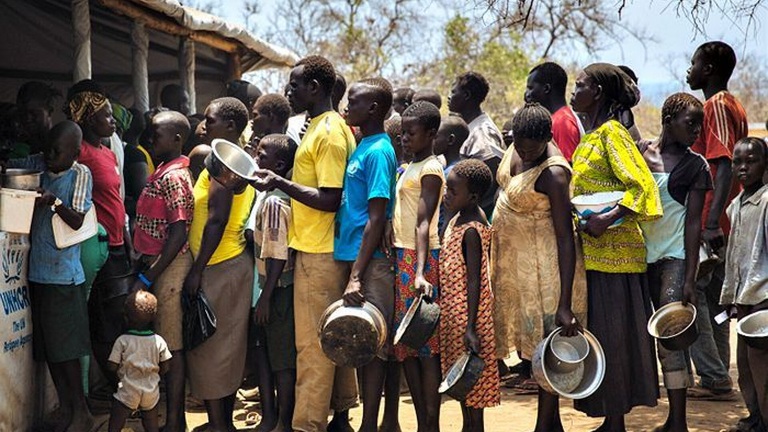,..As Nigeria Celebrates 10 Years of Cadre Harmonise
According to the latest national food and nutrition security analysis, an estimated 34.7 million Nigerians, including over 650,000 internally displaced persons (IDPs) in Borno, Sokoto and Zamfara states, are projected to face crisis (CH Phase 3) or worse levels of food insecurity between June and August 2026.
The report titled “Cadre Harmonice Fiche: Acute Food and Nutrition Insecurity Analysis” was prepared by the Food and Agriculture Organization (FAO) in partnership with the Federal Ministry of Agriculture and Food Security (FMAFS). It provides an updated assessment for October–December 2025 and projections for June–August 2026, covering 27 states and the Federal Capital Territory (FCT).
The report, presented during a national consolidation and validation workshop in Abuja on Friday, shows that while some households have maintained “acceptable” food consumption, more than 55% are doing so by reducing the quality and quantity of food, borrowing money or skipping meals altogether.
Analysis of the findings shows that 27.2 million people, including IDPs, in 27 states are already in food crisis, with the situation likely to worsen in the upcoming recession season.
In Adamawa state alone, about 1.4 million people may face crisis or emergency levels by mid-2026.
Although recent declines in inflation and the consumer price index (CPI) have stabilized staple food prices slightly, the cost of essential complementary foods – such as vegetable oils, dairy products, meat and spices – remains 35% higher on average. Rising transportation costs and the volatile Naira-Dollar exchange rate have further increased the transportation of food and reduced household access to nutritious food.
The report warns that these socio-economic pressures are likely to persist through the recession months, leading to further deterioration in food consumption outcomes and weakening already vulnerable livelihoods.
This highlights a sharp decline in livelihood opportunities, particularly in conflict-affected and agriculture-dependent areas, where insecurity, high input costs and poor market access have restricted farmers' income and access to land.
While government food imports have helped push down consumer prices, the report warns that such measures undermine local agricultural livelihoods, leaving many small farmers in debt after the 2025 harvest season. Compounding the problem, the cost of fertilizers and agrochemicals has increased by 56%, discouraging participation in the upcoming dry-season farming campaign.
The nutrition situation ranges from Alert (Phase 2) to Critical (Phase 3) and Critical (Phase 4) in parts of North-West, North-East and North Central Nigeria, with limited stability recorded in southern parts of Katsina, Jigawa and Benue states.
Borno and Yobe states reported the highest levels of acute undernutrition (stage 4), especially in Maiduguri, Jere, Mobbar and central Borno, while Jibia and Mashi LGAs of Katsina crossed the critical threshold.
In contrast, assessments of IDP camps in Benue State – including Makurdi International Market Camp and Dauda 2 Camp in Guma LGA – revealed acceptable (Phase 1) and alert (Phase 2) nutrition levels, respectively.
Most parts of the northeast and northwest recorded low to moderate mortality (stage 1–2), but areas such as central, northern and southern Borno; Southern Adamawa; Central and Northern Yobe; Eastern Sokoto; Northern Katsina; Western Zamfara; And parts of Kebbi and Jigawa are already facing crisis-level mortality (stage 3). Emergency level mortality (Phase 4) was reported in eastern Borno and northern Adamawa, underscoring deteriorating humanitarian conditions.
The analysis attributes the projected crisis to several interconnected factors, including insecurity, climate shocks, displacement, and policy-related disruptions such as government food imports that reduce local production.
Humanitarian partners have warned that unless urgent action is taken to scale up livelihood support, nutrition interventions and conflict mitigation efforts, millions more Nigerians could be trapped in emergency food insecurity by mid-2026.
Nigeria marks a decade of Cadre Harmonization implementation
In his remarks, FAO Country Representative, Hussein Gaden, said Nigeria has now completed 10 years of implementing Cadre Harmonise (CH) – a critical early warning tool guiding humanitarian and development response planning.
He said Ekiti State joined the CH process for the first time, bringing the number of participating states to 27, while nine others are outside the framework.
“We encourage more states to join this analysis. Ekiti's independent participation and data collection is a powerful example of what commitment can achieve,” Gadan said, urging the remaining states to join before the March 2026 cycle to achieve nationwide coverage.
Gaidain highlighted the multiple shocks that undermine livelihoods, including armed conflict, organized crime, economic pressures and climate extremes, and called for a policy review to better support farmers.
He said, “Conflict and insecurity are displacing farmers and disrupting agricultural activities. Inflation, although declining, is putting pressure on purchasing power. Although food prices have fallen slightly, high costs of fertilizer, seeds and energy threaten future production.”
Also read: Hunger crisis deepens in Nigeria, ranked 115th in Global Hunger Index
Floods, pests and crop diseases have compounded the challenges facing farming communities, he said, stressing the need for stronger resilience strategies and better agricultural planning.
Appreciating the Federal Ministry of Agriculture and Food Security for hosting the workshop, Gaden acknowledged the contributions of UN agencies, state governments, national NGOs and regional partners such as CILSS.
He also thanked FAO technical teams for providing critical data from hard-to-reach areas, including Zamfara, Katsina and Sokoto, which he said was vital to ensuring the accuracy of this year's assessment.
Gaden urged partners in the food security and nutrition sectors to intensify data collection in hard-to-reach areas such as Borno, Adamawa and Yobe, warning that,
“Without reliable data, our ability to plan and respond effectively is compromised.”











